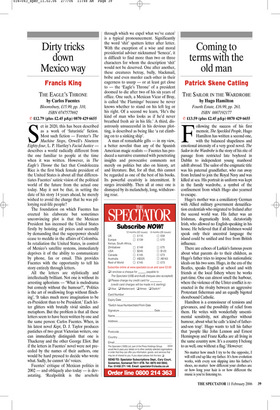Dirty tricks down Mexico way
Francis King
THE EAGLE’S THRONE by Carlos Fuentes Bloomsbury, £15.99, pp. 310, ISBN 0747577692 V £12.79 (plus £2.45 p&p) 0870 429 6655 Set in 2020, this has been described as a work of ‘futuristic’ fiction. Most such fiction — Forster’s The Machine Stops, Orwell’s Nineteen Eighty-four, L. P. Hartley’s Facial Justice describes a world radically different from the one familiar to people at the time when it was written. However, in The Eagle’s Throne the fact that Condoleezza Rice is the first black female president of the United States is about all that differentiates Fuentes’ satiric vision of the political world of the future from the actual one today. May it not be that, in setting the date of his story 14 years ahead, he merely wished to avoid the charge that he was pillorying real-life people?
The foundation on which Fuentes has erected his elaborate but sometimes unconvincing plot is that the Mexican President has incensed the United States firstly by hoisting oil prices and secondly by demanding that the superpower should cease to meddle in the affairs of Colombia. In retaliation the United States, in control of Mexico’s satellite systems, immediately deprives it of the ability to communicate by phone, fax or email. This provides Fuentes with the opportunity to tell his story entirely through letters.
All the letters are stylistically and intellectually brilliant. Not one is without its arresting aphorisms — ‘What is melodrama but comedy without the humour?’, ‘Politics is the art of swallowing frogs without flinching’, ‘It takes much more imagination to be ex-President than to be President.’ Each letter glitters with brutally vivid similes and metaphors. But the problem is that all these letters seem to have been written by one and the same person: Carlos Fuentes. When, in his latest novel Kept, D. J. Taylor produces pastiches of two great Victorian writers, one can immediately distinguish that one is Thackeray and the other George Eliot. But if the letters in Fuentes’ novel were not preceded by the names of their authors, one would be hard pressed to decide who wrote what. Sadly, he cannot ‘do’ voices.
Fuentes’ critique of Mexican politics in 2002 — and obliquely also today — is devastating. ‘Realpolitik is the arsehole through which we expel what we’ve eaten’ is a typical pronouncement. Significantly the word ‘shit’ spatters letter after letter. With the exception of a wise and moral presidential adviser nicknamed ‘Seneca’, it is difficult to find more than two or three characters for whom the description ‘shit’ would not be deserved. One after another, these creatures betray, bully, blackmail, bribe and even murder each other in their eagerness to usurp — or at least get close to — the ‘Eagle’s Throne’ of a president doomed to die after two of his six years of office. One such, a Mexican Vicar of Bray, is called ‘the Flamingo’ because he never knows whether to stand on his left leg or his right. Of a second we learn, ‘He’s the kind of man who looks as if he’d never breathed fresh air in his life.’ A third, disastrously unsuccessful in his devious plotting, is described as being like ‘a rat climbing on to a sinking ship’.
A man of remarkable gifts — in my view, a better novelist than any of the Spanish American magic realists — Fuentes has produced a narrative crammed with penetrating insights and provocative comments not merely on politics but also on history, art and literature. But, for all that, this cannot be regarded as one of the best of his books. Its powerful creativity is intermittent. It surges irresistibly. Then all at once one is dismayed by its melancholy, long, withdrawing roar.














































 Previous page
Previous page